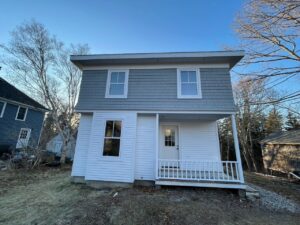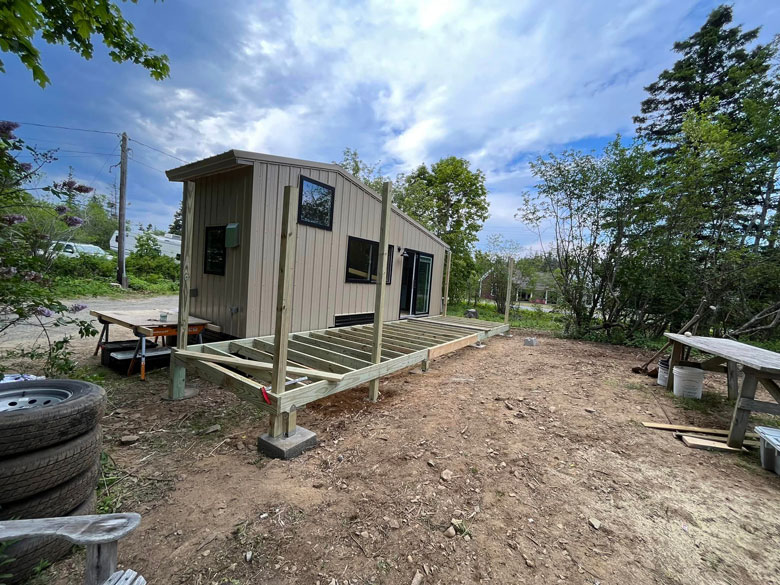In 2007, North Haven Sustainable Housing sold its first affordable year-round home to two island residents, who still live there today with their daughter.
Now, in its 19th year, the non-profit organization has scaled up to meet increasing needs for affordable housing among year-round residents.
By the beginning of July, three new rentals were ready for occupants, and the application and lottery process used to fill the rentals was completed. A multi-year home ownership project is also in development on the recently renamed Fish Hawk Road.
There were 18 applicants for the three available rentals.
Over the past year, NHSH launched its “Our Island Home” campaign, with a short film of the same name. The campaign is raising private and public funds as well as community awareness of the new affordable rental and homeownership opportunities, according to Executive Director Hannah Itzler.
What “really kicked things off was that Maine Housing provided a grant opportunity that’s focused on Maine islands,” said Sam Hallowell, NHSH director of development and construction, and former executive director.
Maine Housing awarded NHSH $840,000 for up to four rental units through its Affordable Housing Initiatives for Maine Islands.
“The funding will significantly fuel our work to create new housing opportunities,” Itzler said, “and will match local dollars and in-kind support that we are raising through our campaign.”

The funds are for “creation or substantial rehabilitation of affordable multi-family rental housing units located on Maine’s island communities.” Applicants have to meet eligibility requirements, and units must be leased as a primary residence and remain as rental housing for 45 years.
Itzler and Hallowell make up the lean two-person staff of NHSH, supported by a bookkeeper. Along with their board of directors, the duo wasted no time in coming up with a variety of strategies to create rental apartments with the Maine Housing funds.
The new rentals illustrate what Hallowell and Itzler mean when they talk about the need for flexibility and nimbleness.
One of the new apartments was constructed in a previously unfinished space above an attached garage on a property owned by NHSH.
Three other rental units were created when NHSH purchased two properties from supportive year-round residents, who have been discussing possible sales with the organization for some time.
In May, the organization closed on a Main Street property with an occupied rental, when an accessory building was allowed. NHSH worked quickly with Brunswick-based developer Backyard ADUs on designing a rental unit and preparing the lot for its arrival. Future plans include renovating the existing rental home.
Last September, NHSH bought a 700-square-foot house near the school and island store. The organization renovated the building over the winter, turning it into a fourth rental.
The four rentals are two-to-three bedrooms and are for two to four occupants.
A fifth, unplanned unit came about when a donor gifted a tiny house. NHSH converted the 200-square-foot home into an accessory dwelling, placing it on a permanent foundation and connecting it to town water and sewer. This is the only unit, in this round of rental offerings, that can be offered to a single individual.
NHSH widely advertised the application process, reinforced with regular updates on Facebook. Itzler explained that eligible applicants chosen in the lottery, who were not offered an apartment, will remain on a waiting list maintained by NHSH. There were 18 applicants for the three available rentals, she said.
Historically, turnover of the organization’s housing is rare because there have been no other year-round options for people who want to remain on the island. If an apartment turns over in the future, it would be offered to the first eligible applicants on the waiting list who meet the unit’s occupancy criteria, Itzler explained.
Key components of sustainability are energy efficiency and deed covenants that retain affordability into the future, according to Hallowell. Whether new construction or renovation, buildings feature quality insulation, air sealing and windows, electric appliances, and heat pumps. Energy efficiency keeps the homes comfortable to live in and the costs of heating, cooling, and maintenance as low as possible, while lessening impacts on the environment, he said.
NHSH uses deed covenants to maintain housing affordability, whether it owns the property or assists with a sale from a private owner directly to a qualified buyer who meets eligibility requirements.
Hallowell spoke with appreciation about all the help and support NHSH receives, and how they could not do without it. The commitment of the two owners who recently sold the rental properties to keeping their homes in year-round ownership and willingness to sell at a reduced cost “is huge, considering the current market for housing where people can sell houses for a lot of money, much more than they could a few years ago,” he said.
Then there’s the historic and significant funding support from the year-round and seasonal community. A recent boost came from the town of North Haven when it named housing the top priority for the island after studying various issues.
“It takes so many people to make all of this happen,” Hallowell said. “From our own staff, our board, the Genesis Community Fund, which has been instrumental in most every project we’ve done in terms of gap funding or mortgages, Maine Housing, all the contractors who recognize the need and are willing to work with us …”
Since its founding in 2005, NHSH has constructed or renovated single-family homes for year-round residents, largely funded through private donations.
Currently, the organization is mid-way through its most ambitious effort to develop single family housing. The major, multi-year effort began in 2017, with the donation of nearly 12 acres on the South Shore Road. The acreage is adjacent to the first piece of land donated to the organization and where its first house was built.
Most of the work to create the new subdivision on Fish Hawk Road is complete. The plan is for five affordable single-family homes and possibly a multi-family unit.
Preparations are underway to receive delivery this fall of the first two modular homes from KBS Builders of South Paris.
The sale of the homes to eligible year-round residents is anticipated in early 2025.
Preceding the organization’s founding, there already was recognition that a lot of houses were being sold into seasonal ownership, and “we needed to do something to keep them year-round, to keep the lights on,” Hallowell said.
Nearly two decades later, NHSH has found many ways to meet its mission. Today, this means “being ready to capitalize on a lot of different opportunities,” Hallowell said.
Itzler has already learned that engaging in conversations on the island—anywhere, at any time, with anyone—can turn into the next housing opportunity.
“If someone has an idea, and you want to run it by the organization, we’re always open to listening,” she said.
To view past projects, current board members and contact information, visit nhshousing.org.





